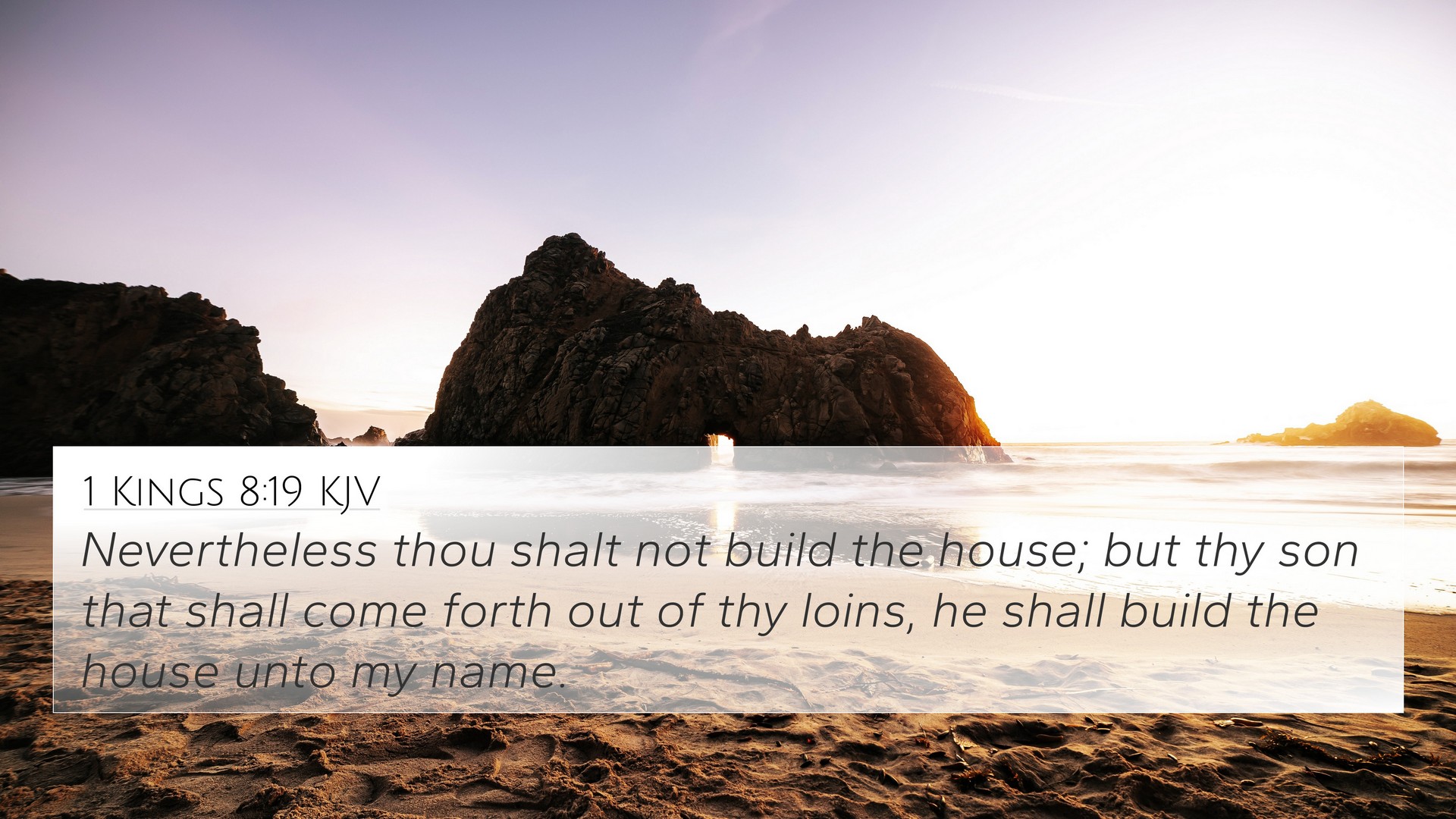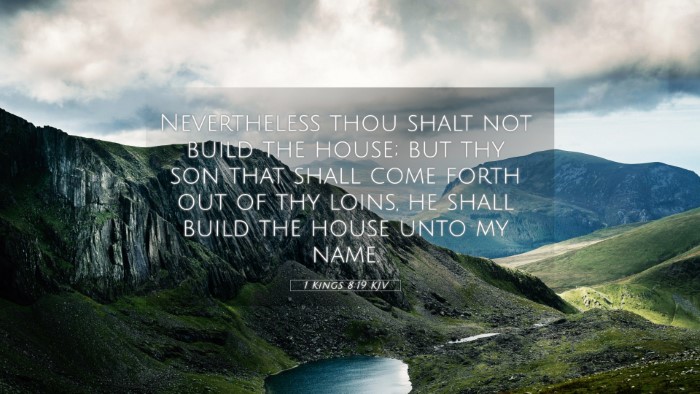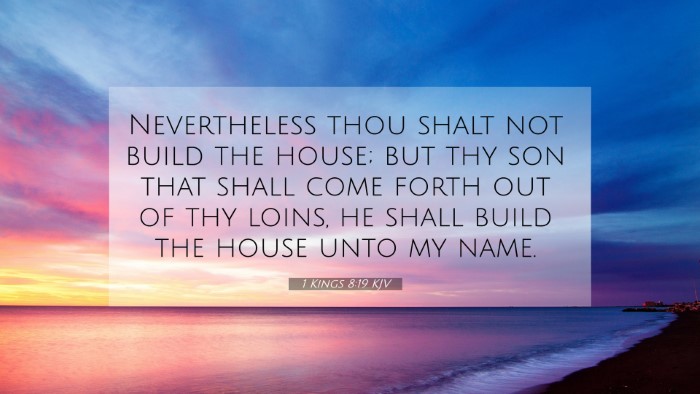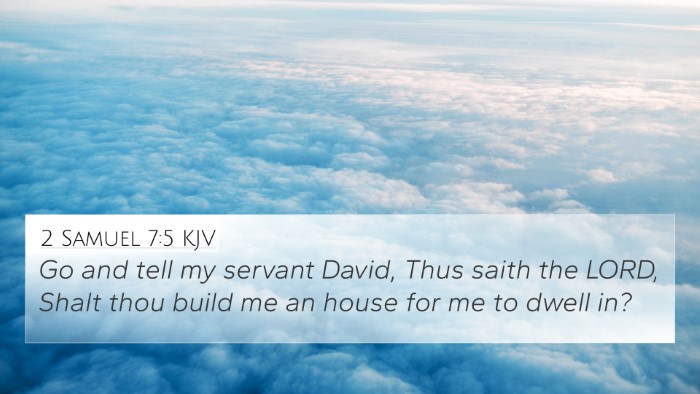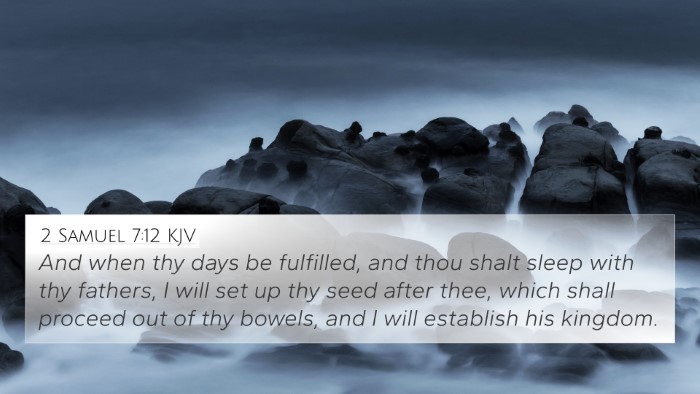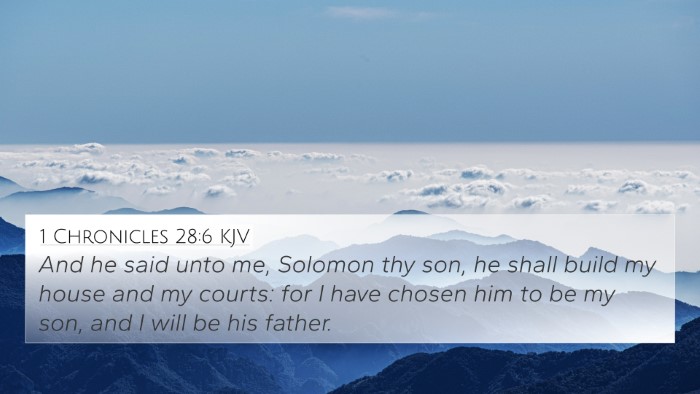Understanding 1 Kings 8:19
Verse: 1 Kings 8:19 states, "Nevertheless, you shall not build the house; but your son who will come from your loins, he shall build the house for My name."
Summary of Meaning
This verse encapsulates God's directive to King David, indicating that while David's desire to build a temple for the Lord will not be fulfilled by him, his son Solomon will carry out this important task. This significant transition evokes themes of divine selection, generational legacy, and the fulfillment of promise.
Commentary Insights
-
Matthew Henry:
Henry emphasizes God's sovereignty in the decision not to allow David to build the temple, underscoring how God's plans surpass human intentions. He notes that David's role in preparing for the temple was essential and commendable, yet God's will required Solomon to fulfill the ultimate task.
-
Albert Barnes:
Barnes highlights the importance of David's preparation for the temple, interpreting this verse as part of the greater narrative of Israel's worship. He explains that God had a specific plan, showing favor on Solomon to not only complete the temple but to contribute to God's glory through it.
-
Adam Clarke:
Clarke discusses the implications of the statement regarding lineage, reflecting on the continuity of God's promise through generations. He points out that while David's ambition was thwarted, it opened the pathway for Solomon’s wisdom and the establishment of a lasting sanctuary for God's presence.
Bible Cross-References
The following verses serve as cross-references, showing the connections between biblical texts that relate to 1 Kings 8:19:
- 2 Samuel 7:13: This verse speaks of the promise that David's offspring will build a house for God.
- 1 Chronicles 22:9: Here, David instructs Solomon about his future role in the building of the temple.
- 1 Kings 6:1: This scripture recounts the commencement of Solomon's construction of the temple.
- Psalm 127:1: A reminder that unless the Lord builds the house, the builders labor in vain, emphasizing God’s role in the temple's establishment.
- Acts 7:47-50: In the New Testament, Stephen mentions Solomon's temple in the context of God’s presence among His people.
- Hebrews 8:1-2: This passage indicates Jesus’ role as a high priest in the heavenly sanctuary, drawing a parallel between the physical temple and spiritual worship.
- John 2:19-21: Jesus speaks of rebuilding the temple, signifying a transformation from a physical structure to His resurrected body as the new temple.
Thematic Connections
This verse not only discusses the immediate context of temple construction but also engages with broader biblical themes:
- God’s Sovereignty: The decision to allow Solomon rather than David to build the temple shows God’s ultimate control over His plans.
- Generational Promises: The continuation of David’s legacy through Solomon emphasizes God's faithfulness to His promises across generations.
- The Nature of Worship: The temple represents a physical manifestation of worship, inviting reflection on both communal and personal expressions of faith.
- The Role of Leadership: The transition from David to Solomon illustrates the importance of wise leadership in fulfilling God’s purposes.
Applying Cross-Referencing Techniques
When studying 1 Kings 8:19, employing tools for cross-referencing can deepen understanding:
- Bible Concordance: Utilize a Bible concordance to find words and themes related to "temple" and "David" to trace connections.
- Bible Cross-Reference Guide: Look for guides that point to other verses involving temple construction and the Davidic covenant.
- Cohesive Study Methods: Engage in cross-referencing Bible study methods that allow for thematic exploration between the Old and New Testaments.
Conclusion
1 Kings 8:19 is a pivotal verse, illustrating God’s deliberate choice regarding the building of His temple. It invites readers to explore the broader narrative of scripture through cross-referencing and connecting themes across different parts of the Bible. This verse not only enriches our understanding of God's plans but also challenges us to consider our roles in the legacy of faith.
By examining 1 Kings 8:19 alongside related passages, believers gain insights into the continuity of God's promises and the importance of obedience in following His divine will.
